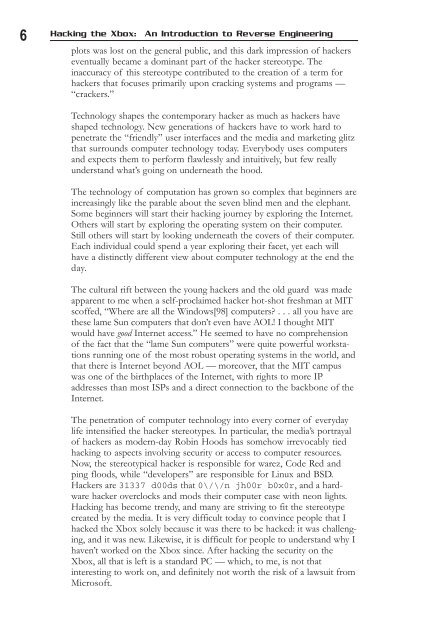Hacking the Xbox
Hacking the Xbox
Hacking the Xbox
You also want an ePaper? Increase the reach of your titles
YUMPU automatically turns print PDFs into web optimized ePapers that Google loves.
6<br />
<strong>Hacking</strong> <strong>the</strong> <strong>Xbox</strong>: An Introduction to Reverse Engineering<br />
plots was lost on <strong>the</strong> general public, and this dark impression of hackers<br />
eventually became a dominant part of <strong>the</strong> hacker stereotype. The<br />
inaccuracy of this stereotype contributed to <strong>the</strong> creation of a term for<br />
hackers that focuses primarily upon cracking systems and programs —<br />
“crackers.”<br />
Technology shapes <strong>the</strong> contemporary hacker as much as hackers have<br />
shaped technology. New generations of hackers have to work hard to<br />
penetrate <strong>the</strong> “friendly” user interfaces and <strong>the</strong> media and marketing glitz<br />
that surrounds computer technology today. Everybody uses computers<br />
and expects <strong>the</strong>m to perform flawlessly and intuitively, but few really<br />
understand what’s going on underneath <strong>the</strong> hood.<br />
The technology of computation has grown so complex that beginners are<br />
increasingly like <strong>the</strong> parable about <strong>the</strong> seven blind men and <strong>the</strong> elephant.<br />
Some beginners will start <strong>the</strong>ir hacking journey by exploring <strong>the</strong> Internet.<br />
O<strong>the</strong>rs will start by exploring <strong>the</strong> operating system on <strong>the</strong>ir computer.<br />
Still o<strong>the</strong>rs will start by looking underneath <strong>the</strong> covers of <strong>the</strong>ir computer.<br />
Each individual could spend a year exploring <strong>the</strong>ir facet, yet each will<br />
have a distinctly different view about computer technology at <strong>the</strong> end <strong>the</strong><br />
day.<br />
The cultural rift between <strong>the</strong> young hackers and <strong>the</strong> old guard was made<br />
apparent to me when a self-proclaimed hacker hot-shot freshman at MIT<br />
scoffed, “Where are all <strong>the</strong> Windows[98] computers? . . . all you have are<br />
<strong>the</strong>se lame Sun computers that don’t even have AOL! I thought MIT<br />
would have good Internet access.” He seemed to have no comprehension<br />
of <strong>the</strong> fact that <strong>the</strong> “lame Sun computers” were quite powerful workstations<br />
running one of <strong>the</strong> most robust operating systems in <strong>the</strong> world, and<br />
that <strong>the</strong>re is Internet beyond AOL — moreover, that <strong>the</strong> MIT campus<br />
was one of <strong>the</strong> birthplaces of <strong>the</strong> Internet, with rights to more IP<br />
addresses than most ISPs and a direct connection to <strong>the</strong> backbone of <strong>the</strong><br />
Internet.<br />
The penetration of computer technology into every corner of everyday<br />
life intensified <strong>the</strong> hacker stereotypes. In particular, <strong>the</strong> media’s portrayal<br />
of hackers as modern-day Robin Hoods has somehow irrevocably tied<br />
hacking to aspects involving security or access to computer resources.<br />
Now, <strong>the</strong> stereotypical hacker is responsible for warez, Code Red and<br />
ping floods, while “developers” are responsible for Linux and BSD.<br />
Hackers are 31337 d00ds that 0\/\/n jh00r b0x0r, and a hardware<br />
hacker overclocks and mods <strong>the</strong>ir computer case with neon lights.<br />
<strong>Hacking</strong> has become trendy, and many are striving to fit <strong>the</strong> stereotype<br />
created by <strong>the</strong> media. It is very difficult today to convince people that I<br />
hacked <strong>the</strong> <strong>Xbox</strong> solely because it was <strong>the</strong>re to be hacked: it was challenging,<br />
and it was new. Likewise, it is difficult for people to understand why I<br />
haven’t worked on <strong>the</strong> <strong>Xbox</strong> since. After hacking <strong>the</strong> security on <strong>the</strong><br />
<strong>Xbox</strong>, all that is left is a standard PC — which, to me, is not that<br />
interesting to work on, and definitely not worth <strong>the</strong> risk of a lawsuit from<br />
Microsoft.


